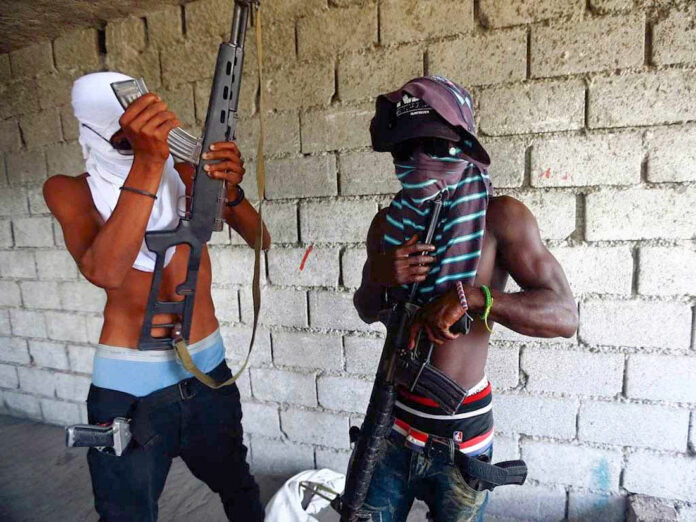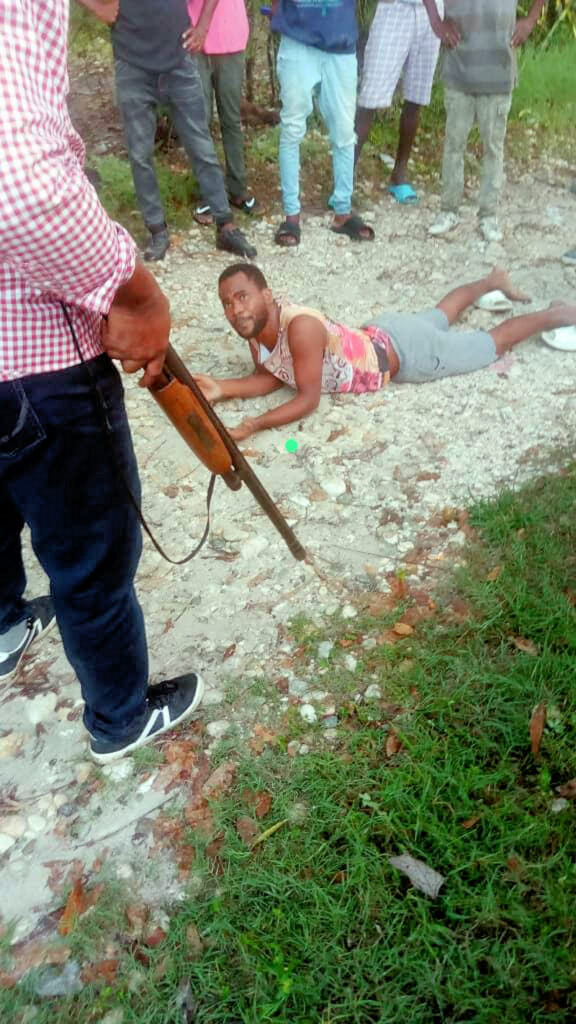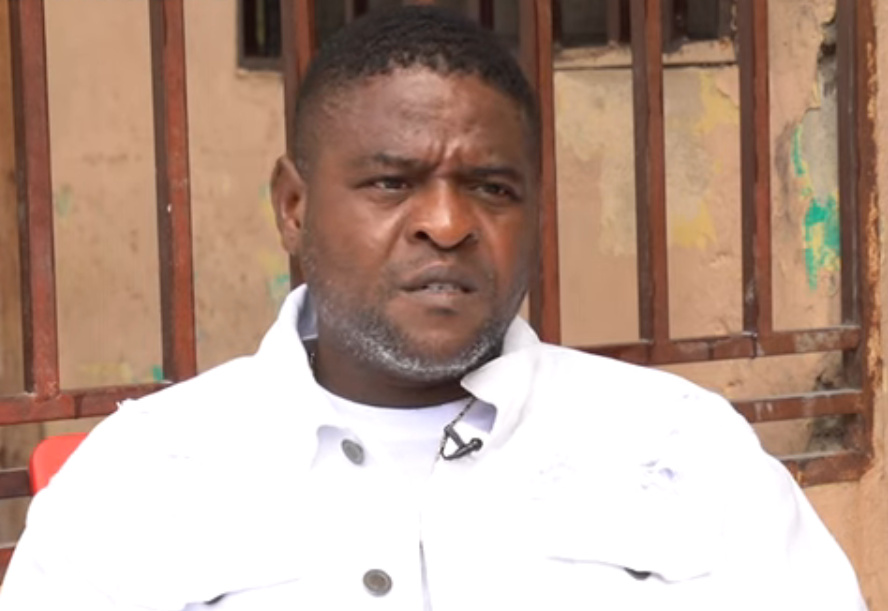
(Français)
Last week began with declarations of peace and national unity to oust de facto Prime Minister Ariel Henry and support Haitian farmers building an irrigation canal in the Northeast Department.
In Delmas, a unified march of formerly warring neighborhood groups on Sep. 18 announced the creation of a new front called Viv Ansanm (Live Together). The anti-kidnapping “Revolutionary Forces of the G9 Family and Allies” (G9) federation had merged with its former antagonist, the G-Pèp federation, most of whose members were involved in kidnapping.
On social media, voice messages from several G-Pèp leaders announced that all Haitians should feel free to travel to the north or south, unmolested in any way by the criminal gangs which had terrorized, extorted, and abducted them leaving or entering Port-au-Prince for the last five years.
Even the Chen Mechan (Bad Dog) G9-affiliate in Croix-des-Missions, which had vowed to keep fighting against criminal gangs north of the capital, relented mid-week and joined in the Viv Ansanm peace euphoria.
But before the weekend, the promise of “living together” proved to be a mirage when the same criminal gangs which had vowed to change their conduct carried out deadly attacks on the rural towns of Saut d’Eau and Mirebalais.
Around 3 p.m. on Fri., Sep. 22, heavily armed men from the “Taliban” gang run by Jeff Larose in the capital’s northern suburb Canaan arrived in jeeps and motorcycles in the small town of Saut d’Eau, famous for a waterfall which many Haitians visit for leisure, tourism, and religious reasons.

The bandits killed at least 12 people (possibly as many as 23, according to some reports) and wounded no less that 14, looting and burning several houses and at least 10 vehicles.
Despite desperate calls to them for help, no police officers came to the population’s defense. On the contrary, local cops abandoned the understaffed Saut d’Eau police station, which the Taliban looted and burned before leaving the scene around 1 a.m. with several stolen motorcycles and vehicles.
Johnson “Izo” Alexandre, the leader of the Five Seconds gang in Port-au-Prince’s Village de Dieu neighborhood, took to social media on Sep. 25 to, in effect, claim responsibility for mobilizing his G-Pèp Taliban allies to carry out the attack because some unidentified people near Saut d’Eau had held up at gunpoint his “people” and “took something from them,” although he refrained from identifying what it was. Many people speculated that it may have been guns, which are trafficked into Haiti from the Dominican Republic, whose border is only 30 miles away from the town. Popular journalist Teriel Telus, however, claimed that Izo’s soldiers were ambushed by people who took their money, which had presumably been for the purchase of weapons.
Although on Sun., Sep. 24 Departmental Unit for the Maintenance of Order (UDMO) specialized police set up check points on roads in the area, again on Mon., Sep. 25, almost 60 gang members entered Saut d’Eau, “shooting in all directions,” according to the town’s mayor, Marie Andrée Ruth Thélus. She said they stole 14 vehicles and torched several houses. UDMO cops were deployed to the scene but “were powerless, faced with the number and violence of the attackers,” the mayor said.
Later that day, the gang attacked Mirebalais, ten miles east of Saut d’Eau, and at 2 a.m. on Sep. 26, fired on the well-appointed University Hospital of Mirebalais, pocking walls and shattering windows. They even shot up a neonatal intensive care unit (NICU).

Following the attacks in Mirebalais, on Sep. 26, town residents there and in Saut d’Eau captured and lynched at least eight suspected gang members, La Prensa reports. The spontaneous popular response by crowds, armed mostly with machetes, appears to be a resurgence of the Bwa Kale movement that flared in Haiti from late April through June, during which crowds summarily executed some 250 alleged criminals.
Meanwhile, late last week, there were social media reports that Taliban gang members were stopping trucks and buses traveling north near Morne Cabrit, despite assurances they would not do so. Furthermore, vehicles that did not stop for the gang were fired on, although no casualties were reported.
The shocking attacks have immediately thrown into question the “peace” that the G9 and G-Pèp federations had brokered in forming the so-called “Live Together” front.
Many Haitians in Haiti and its diaspora who supported the G9’s anti-crime, social change agenda were highly alarmed by the Viv Ansanm alliance, which ostensibly merged neighborhood defense committees with the G-Pèp’s criminal gangs. Already there were misgivings that attacks on the capital’s Carrefour Feuilles neighborhood by Renel “Ti Lapli” Destina’s Grand Ravine gang and on Solino and Fort National neighborhoods by Kempes Sanon’s Belair gang were facilitated by peace accords with G9 groups. Some radio pundits argued that Viv Ansanm was mixing good apples with bad and would lead to more trouble. Those warnings have now proved warranted.
Meanwhile, as the U.S. prepares to invade Haiti behind 1,000 Kenyan police officers in the near future, U.S. Special Forces have already been deployed in Haiti for over a month and are training a newly formed and announced specialized police brigade called UTAG, the Temporary Anti-Gang Unit.
The main goal is to neutralize Cherizier and other G9 and G-Pèp leaders, explained Haitian-American Jean-Pierre Alfred, a former Air Force Special Operations Command airman, in an in-depth interview to be aired this week by the online site Redacted.
Concerning prominent G9 leader Jimmy “Barbecue” Cherizier, Redacted correspondent Dan Cohen asked Alfred: “Do you think this [Viv Ansanm peace deal] could be some way to try to discredit or destroy him?”
“Sure,… aligning himself with these factions, it’s almost like he’s shooting himself in the foot,” Alfred replied.

Cherizier “knows that he can’t reach a political understanding with the government,” he continued. “They’re not willing to listen to him. So he has to go this route. The danger… is that these guys [the G-Pèp gangs] are essentially mercenaries; they’ll do anything for money. So they’ll bring him in, only to later kill him” which gives the U.S. and Haitian governments “the plausible deniability of saying ‘well, we didn’t kill him, he was killed by his own people.’ And that’s typically how these things have always unraveled… The political leader is killed by somebody within his own faction.”
Alfred also explained that the U.S. would rather co-opt Cherizier, if that were possible. “If I can control Barbecue, it’s more to my advantage, because it’s easier to control one than it is to control 50, 100, or 1000,” he said, “because if I can control Barbecue, and he controls 1000, I can now, de facto, put all my political capital in that political bucket and let him be the political face of it. Coincidentally, if it goes bad, he’s also the face of it. And it’s not a matter of if, it’s a matter of when it goes bad. You now have a fall guy.”
So in that sense, Cherizier becomes “a useful idiot, in essence,” Alfred concluded.










[…] (English) […]